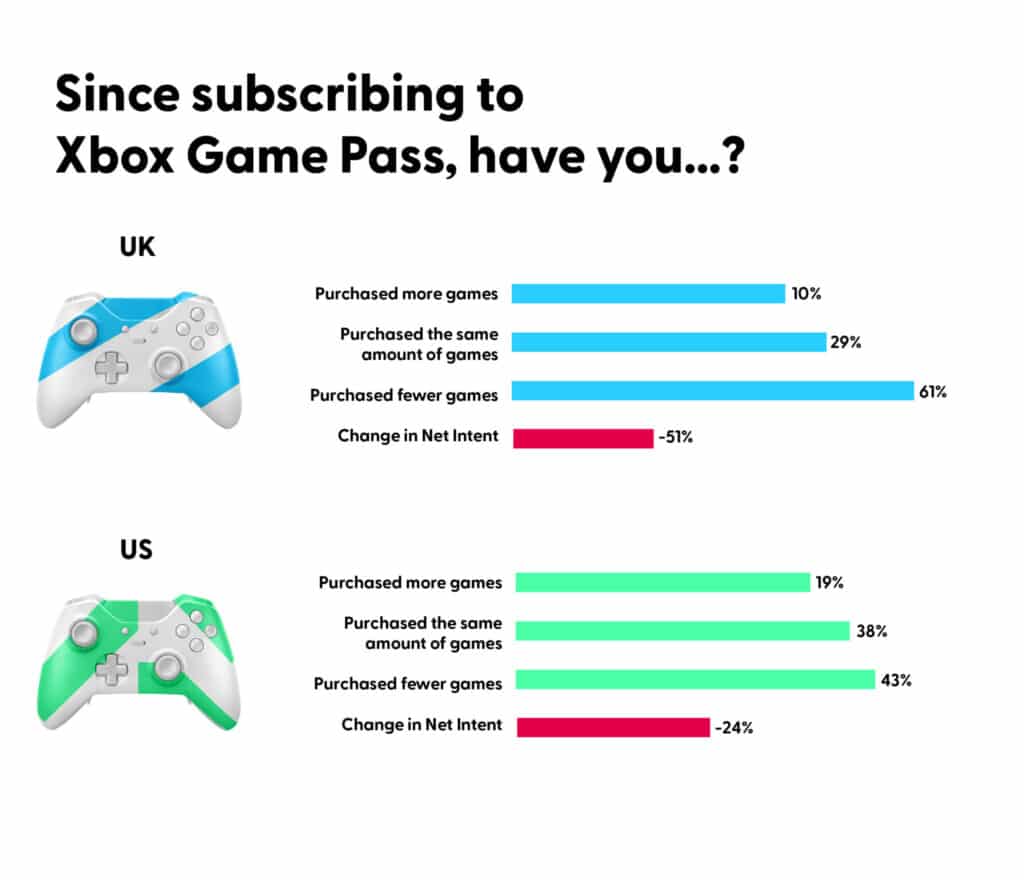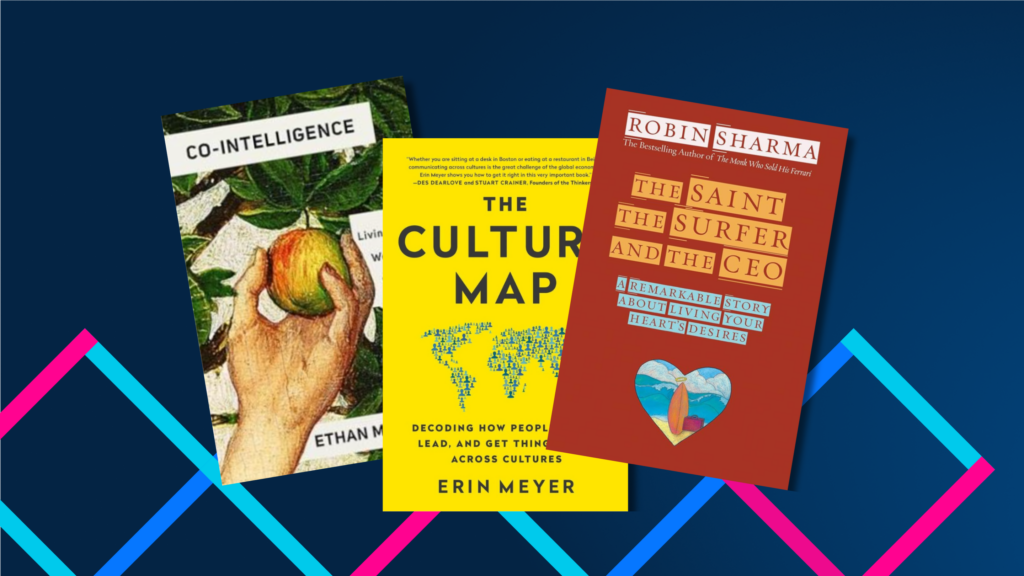Just like in other entertainment and media sectors, subscriptions are becoming the name of the game in the gaming industry. Offerings such as Xbox Game Pass and the newly revamped PlayStation Plus have become huge areas of focus for Microsoft and Sony, respectively, which has led to a spending spree on publisher, studio, and IP acquisitions to secure the best content to gain and retain subscribers. And while not all gamers are on board with these services, the reality is that over six in ten think subscriptions are the future of video gaming.
To understand consumer sentiment about gaming subscriptions, and how the current cost of living crisis is impacting their behavior, Toluna surveyed over 4,000 active Console and PC gamers in the United Kingdom and United States in May 2022. Here’s what we found.
The state of subscription services
Overall, more than half of active gamers say that they’re interested in gaming subscription services. Of those who use these services, nearly eight in ten rate them as high quality, while three in four rate them as good value. The main value proposition of subscription services? Nearly three-quarters of respondents agree that they allow them to try more games and expand their horizons. This represents a compelling proposition for many gamers.
Of course, there is a cohort of gamers who are philosophically opposed to the subscription model. Almost three in ten respondents say that owning games is important to them, and they dislike the idea of subscribing instead of owning outright. However, that still leaves the vast majority of gamers who accept subscriptions for their value benefits, even if they do feel that they would rather own games than subscribe.
Evaluating key industry players
Microsoft and Sony have long been in competition with one another when it comes to their flagship game consoles, and it’s no different when it comes to subscription services.
To build upon those numbers and retain subscribers, both Xbox and PlayStation have gone on recent spending sprees to acquire studios and their intellectual property. Microsoft acquiring Activision Blizzard is the biggest deal in gaming history. In turn, these acquisitions enable them to bolster game libraries and add to overall subscription value—both of which are huge factors for subscriber retention. In fact, the number of major games, exclusive games to platform, and library size are the top three considerations after cost when it comes to retaining a subscription.
When looking at Xbox Game Pass subscribers, specifically, we asked them whether their subscription impacted the number of games they were buying outright. Predictably, the answer was yes for many—albeit with a significant disparity between the US and UK.Just like in other entertainment and media sectors, subscriptions are becoming the name of the game in the gaming industry. Offerings such as Xbox Game Pass and the newly revamped PlayStation Plus have become huge areas of focus for Microsoft and Sony, respectively, which has led to a spending spree on publisher, studio, and IP acquisitions to secure the best content to gain and retain subscribers. And while not all gamers are on board with these services, the reality is that over six in ten think subscriptions are the future of video gaming.
To understand consumer sentiment about gaming subscriptions, and how the current cost of living crisis is impacting their behavior, Toluna surveyed over 4,000 active Console and PC gamers in the United Kingdom and United States in May 2022. Here’s what we found.
The state of subscription services
Overall, more than half of active gamers say that they’re interested in gaming subscription services. Of those who use these services, nearly eight in ten rate them as high quality, while three in four rate them as good value. The main value proposition of subscription services? Nearly three-quarters of respondents agree that they allow them to try more games and expand their horizons. This represents a compelling proposition for many gamers.
Of course, there is a cohort of gamers who are philosophically opposed to the subscription model. Almost three in ten respondents say that owning games is important to them, and they dislike the idea of subscribing instead of owning outright. However, that still leaves the vast majority of gamers who accept subscriptions for their value benefits, even if they do feel that they would rather own games than subscribe.
Evaluating key industry players
Microsoft and Sony have long been in competition with one another when it comes to their flagship game consoles, and it’s no different when it comes to subscription services.
To build upon those numbers and retain subscribers, both Xbox and PlayStation have gone on recent spending sprees to acquire studios and their intellectual property. Microsoft acquiring Activision Blizzard is the biggest deal in gaming history. In turn, these acquisitions enable them to bolster game libraries and add to overall subscription value—both of which are huge factors for subscriber retention. In fact, the number of major games, exclusive games to platform, and library size are the top three considerations after cost when it comes to retaining a subscription.
When looking at Xbox Game Pass subscribers, specifically, we asked them whether their subscription impacted the number of games they were buying outright. Predictably, the answer was yes for many—albeit with a significant disparity between the US and UK.

This decrease in purchasing games is largely due to the size of Game Pass’s library, as well as the amount of day-one releases it offers. However, there are still those that are buying more games—particularly in the United States. Those that are buying more games say this is due to Game Pass broadening their tastes in both new games (50%) and new genres (48%) that they perhaps wouldn’t have considered purchasing.
Overall, while game purchasing may have declined, this absolutely does not mean a decline in gaming revenues given the substantial cost of the subscription itself and the potential to generate revenue on in-game spend on a wider roster of games. Gamers also indicated that they are more inclined to purchase Downloadable Content (DLC) from games when using subscriptions.
Impact of the cost of living crisis
With consumers across the globe feeling the impact of inflation, they’re increasingly conscious about their spending—and this is no different in the US or UK. When we asked gamers how rising prices and the cost-of-living crisis would impact their entertainment spending, most said they would spend less or that they already cut back. This was most true in the UK (58%), but almost half of US gamers (48%) said the same.
However, there are indications that gaming may be more resilient in the face of the cost-of-living crisis. Xbox Game Pass subscribers, specifically, were more likely to say they’d cut back on music subscription services than their gaming subscription, if forced to cut back.
With economic problems set to remain for the foreseeable future, consumer behavior will only continue to evolve. That’s why it’s critical that gaming brands develop an insights-driven approach to understanding consumers’ thoughts, predicting their behaviors, and developing strategies to respond to changes. In doing so, brands can adapt their products, services, and strategies to reflect the evolving economic landscape.




